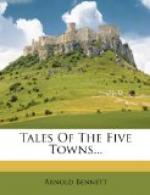Mark Beechinor was thirty, just nineteen years younger than his brother. Tall, uncouth, big-boned, he had a rather ferocious and forbidding aspect; yet all women seemed to like him, despite the fact that he seldom could open his mouth to them. There must have been something in his wild and liquid dark eyes which mutely appealed for their protective sympathy, something about him of shy and wistful romance that atoned for the huge awkwardness of this taciturn elephant. Mark was at present the manager of a small china manufactory at Longshaw, the farthest of the Five Towns in Staffordshire, and five miles from Bursley. He was an exceptionally clever potter, but he never made money. He had the dreamy temperament of the inventor. He was a man of ideas, the kind of man who is capable of forgetting that he has not had his dinner, and who can live apparently content amid the grossest domestic neglect. He had once spoilt a hundred and fifty pounds’ worth of ware by firing it in a new kiln of his own contrivance; it cost him three years of atrocious parsimony to pay for the ware and the building of the kiln. He was impulsively and recklessly charitable, and his Saturday afternoons and Sundays were chiefly devoted to the passionate propagandism of the theories of liberty, equality, and fraternity.
’Is it true as thou’rt for marrying Sammy Mellor’s daughter over at Hanbridge?’ Edward Beechinor asked, in the feeble, tremulous voice of one agonized by continual pain.
Among relatives and acquaintances he commonly spoke the Five Towns dialect, reserving the other English for official use.
Mark stood at the foot of the bed, leaning with his elbows on the brass rail. Like most men, he always felt extremely nervous and foolish in a sick-room, and the delicacy of this question, so bluntly put, added to his embarrassment. He looked round timidly in the direction of the girl at the window; her back was towards him.
‘It’s possible,’ he replied. ‘I haven’t asked her yet.’
‘Her’ll have no money?’
‘No.’
’Thou’lt want some brass to set up with. Look thee here, Mark: I made my will seven years ago i’ thy favour.’
‘Thank ye,’ said Mark gratefully.
‘But that,’ the dying man continued with a frown—’that was afore thou’dst taken up with these socialistic doctrines o’ thine. I’ve heard as thou’rt going to be th’ secretary o’ the Hanbridge Labour Church, as they call it.’
Hanbridge is the metropolis of the Five Towns, and its Labour Church is the most audacious and influential of all the local activities, half secret, but relentlessly determined, whose aim is to establish the new democratic heaven and the new democratic earth by means of a gradual and bloodless revolution. Edward Beechinor uttered its abhorred name with a bitter and scornful hatred characteristic of the Toryism of a man who, having climbed high up out of the crowd, fiercely resents any widening or smoothing of the difficult path which he himself has conquered.




